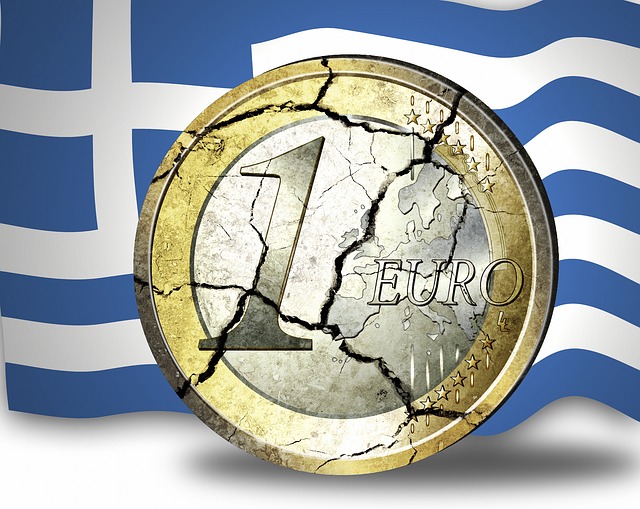Question: The Greek financial crisis has occupied a major place in the arena of local European events and internationally as well. It also took in a wide array of dimensions in terms of discussions, analysis, questions and expectations… Then Greece’s agreement upon the European rescue plan was announced. So we ask: What is the reality of this crisis and how did it arise? Then, what is the role of the influential states in respect to this crisis? And finally, will this plan solve the Greek crisis?
Answer:
To answer that we will present the most important recent aspects related to this crisis and especially since we have already presented our #analysis in respect to the happenings this subject area at that time on 28/02/2015. Despite that we will go through what has happened whilst focusing on what is new:
Firstly – Reality of the crisis:
1 – The roots of the economic crisis in Greece had begun since it entered the Euro Zone in 2001 where the American government via the US credit rating companies as they raised the rating classification for Greece in order for it meet entry requirements for the Euro Zone. Greece was aware of that as they: “had hidden its financial situation from the leaders of the Euro Zone.
Then after joining the Euro, the government of the Centre-right New Democracy Party under the leadership of Kostas Karamanlis came to power in March 2004 to discover some shocking truths. The most significant of which was that the budget deficit was not 1.5% as the previous government had stated when it joined the Euro but rather it had actually reached 8.3%, five and a half times higher than it had believed” (Idaa’aat Misr ul-Arabiyah 22/07/2015). In this way America wanted to plant explosive mines inside the Euro Zone so that if those debts were to explode, the Euro Zone would fall into a crisis leading to the fall of the Euro value which will not no longer rival the Dollar. And this is what came to pass as it wasn’t long until the Greek crisis was uncovered from the huge debts that were upon it.
2 – Since 2008 Greece has been attempting to escape from the crisis through taking loans to meet the debt payments but to no avail. Successive #governments consistently pumped money into the economy through loans as well but they were unable to save the country’s economy. So they took loans to pay accumulating debts and to pay the service charges from the compound interest and insurance fees paid upon the loans. “And at this point other states intervened in the Euro zone in a form that was called Troika consisting of the European #Commission, the European Central Bank and the IMF in order to support Greece. And in May 2010 the leaders of the Euro Zone and the Greek government agreed to a rescue loan worth 110 Billion Euros. However, the rescue came with strict conditions which included improving the government’s collection of taxes and reducing the public spending in an attempt to adjust the country’s public budget. And because the rescue loan was not sufficient to improve the situation in Greece, the government agreed in February 2012 to obtain another rescue loan so that the combined sum of loaned money reached 246 Billion Euros.
A new austerity plan was agreed with even more severe stipulations than the first. Then the matters continued to worsen so that the percentage of unemployment reached more than 25% and amongst the young more than 50%” (Idaa’aat Misr ul-Arabiyah, 22/07/2015). This is what led to lower tax revenues which in turn led to a severe lowering of the government’s budget thus making the Greek government incapable from fulfilling its debt payments at the due time. Greece struggled in order to remain faithful in paying its outstanding debts to the IMF and the European #Bank and so it attempted to negotiate with them both however the creditors refused to alter the conditions of the payments. And so in this way Greece continued to falter in its economic situation drowning in its debts…
The government then began to think about another new austerity package! However the people in Greece endured previous austerity packages whilst the elections were in November 2014. So Tsipras took advantage of this situation and made his #election campaign based on opposition to austerity and he rallied the people to reject the European Union’s projects and conditions of the creditors whilst declaring that if he was to win he would renegotiate conditions so they did not comprise of austerity measures… he then went on to win the elections.
3 – Tsipras was unable to change anything from the European Union and creditors conditions and he was unable to lessen the debts in spite of the protests and demonstrations that he rallied the people for. This is because he was confronting “Capitalist policies” which suck the blood with a right hand; he confronted them with a mixture of “Capitalist policies and others which were socialist” which suck the blood with a left hand!
These policies do not bring about a blissful living or rectitude of life but rather a struggle that virtually has no end to it… As such the crisis was aggravated and the confidence plummeted and indeed snatched from the Greek banking system and so the withdrawal of deposits rapidly increased: “Kathimerini Newspaper said that Greek depositors withdrew more than 2 Billion Euros since the beginning of the current week according to Greek bank estimations…” (Al-Jazeera, 21/02/2015). “Statements issued by the Greek Central Bank revealed that the deposits in private banks had retracted by around 23 Billion Euros representing approximately 18% of the sum total of deposits in the period between November 2014 and March 2015…” (Statistics Site, 03/06/2015).
And “the amount of wealth that was withdrawn in the period between two days the 15th and 18th of June 2015 was about three billion Euros ($3.39 billion) which represents roughly 2.2% of the total individual and company deposits in the Greek banks (as it was) at the end of April” (Reuters 19/06/2015).
4 – Even though Greece was drowning in the crisis and its condition was pitiful, the European Union and particularly Germany nevertheless continued its acute attacks filled with austerity conditions.
As such, Germany demanded from Greece to implement the austerity programme in return for financial rescue procedures and economic assistance.
This included Greece reducing its spending, completely halting its social care spending, reducing the number of government employees and to make the #repayment of debts the priority regardless of the pain that this would cause the ordinary Greek citizen.
Indeed the austerity measure imposed by Germany led to social, economic and political chaos. In this way, the current crisis intensified as we mentioned above and particularly due to the intensification of the withdrawals made from the banks which was followed by the closing of the banks…
The negotiations began and the Greek government requested an additional rescue period of four months hoping that these negotiations would be successful in respect to improving the conditions of the rescue #agreement which had been determined to end in June 2015. These were the negotiations which the left-wing Syriza party had promised that if they were to win the elections at the end of 2014 it would renew negotiations over the Greek debts and would never submit to the austerity conditions of the creditors. Indeed it was upon that basis that the elections were won…
It had previously been determined that the Greek government would pay an outstanding debt of 1.6 billion Euros at the end of June 2015 however it was in need of rescue money from the European Union to make that payment and so it wanted to bring about a change to the terms of the agreement to attain this money.
This return to negotiations led to many meetings that did not reach an agreement. For that reason the spokesman for the IMF Gerry Rice on Thursday the 11th of June clarified the reason for the withdrawal of its negotiators from the Greek rescue talks when he said: “The ball to a large extent is in the Greek court. There are big differences between us in most of the main issues.
There has not been any progress in respect to narrowing these differences recently.” IMF accused Athens of not offering concessions.
The #Dutch Finance Minister Jeroen Dijsselbloem followed him in respect to that on the 12th of June when he said: “… We are unable to help Greece if Greece does not want to help itself… they have to bring serious proposals”.
5 – The Greek government proposed a number of packages in place of the European Union’s conditions however the European Union rejected them every time.
On the other hand, the European Union’s proposed package consisted of sharp reductions in retirement pensions, government employees and the government’s budget in return for rescue money and money for the Greek banks.
Germany strongly took the lead with this package at the same time that the Greek government wanted the debts to be written off and for the austerity measures to be spread over more years whilst it strongly rejected the austerity demands that came from the European Union…
As the European Union, negotiators refused to change their conditions and held back the money that Greece was going to use to pay its outstanding debts on the 27th of June. As such the Greek government announced that it would present the proposed Union’s conditions in the #negotiations to the people in a referendum on the 5th of July 2015…
The Greek government was trying to blackmail the European Union by using the referendum with the hope that the negotiators of the European Union would be more lenient.
6 – On the eve of the referendum the Greek #Prime_Minister urged the voters to reject those conditions with a ‘No’ vote in the referendum. In order to encourage those who wanted to remain in the European Union to vote ‘No’ the Greek Prime Minister Tsipras said in a televised speech that Greece’s membership in the Euro Zone is not in danger…
On the 5th of July the large majority of Greek citizens rejected the conditions of the rescue plan as 61% voted in favour of that whilst 39% voted against whilst the percentage of those who participated was 62.5%… Even though the vote came with a ‘No’ it did not have an effect in respect to budging the Union and particularly Germany from the same conditions. And for that reason Greece agreed to present new proposals and that was for the Euro Summit on the 7th of July. And despite that the German Ministry of Finances refused to study any proposal related to reducing the debts of Greece!
7- After some give and take the Euro group and Greece arrived at an agreement between them on 13/07/2015 to complete, in accordance to it, holding talks about what is called the rescue programme worth 87 Billion Euros for a period of three years in exchange for the semi-bankrupt country to remain within the Euro Zone.
This agreement which the Greek government was compelled to sign stipulates an increase in taxes, the reform of the retirement system or to squeeze the retirees, putting in place a mechanism to reduce spending, build a law of civil procedures, making a law related to extending liquidity to Greek banks, the privatisation of public properties that the current government opposed and to establish a fund related to that which is handed over to the three creditor entities to Greece which are the European Commission, the Central European Bank and the IMF.
This is whilst representatives of these three forces will return to Athens to supervise the Greek economy granting them the jurisdiction of objecting to the government’s decisions and to intervene in some projects of law and referendums.
And in accordance to the stipulations of the agreement the Value Added Tax (VAT) will increase from 13% to 33% upon many services and goods. Greece was able to restructure its debts from the agreement, which had reached 320 billion Euros but it was unable to write off any part from them. It obtained a middle-term loan in a package worth 35 billion Euros with the claim that it could attract new investments to lift the country from the state of #economic stagnation… In this way the leaders of the Euro Zone compelled the Greek Prime Minister Tsipras to abandon what he had pledged in respect to putting an end to the austerity just as they compelled him for Greece to give up a great portion of its sovereignty in terms of foreign supervision over the country from those three creditor forces. Upon this basis, on 20/07/2015, the European Union’s Emergency Fund gave an urgent loan to Greece worth 7.16 Billion Euros so that it could meet its urgent payments to the IMF and the European Central Bank in accordance to the European rescue plan for Greece.
The Greek Finance Ministry stated that it: “Would pay (from this loan) 4.2 billion Euros from the original loan (worth 3.5 billion Euros) and that the outstanding interest upon it (worth 700 million Euros) to the Central European Bank in addition to 2.05 billion Euros to the IMF from the delayed outstanding payment which had been due on 30/06/2015. It will also return a loan worth 500 million Euros to the Greek Central Bank” (The Middle East, 20/7/2015). Therefore the loan from the Union is not to rescue its economy but rather it is borrowed to repay an urgent debt which is a part of the large debt that has accumulated upon it in addition to the compound interest. In this way Greece will remain drowning in the quagmire of debts. In the wake of that Greek banks opened its doors to banking services within restrictions placed upon the process of withdrawals and monitoring of capital which will remain in force for at least another month although this will be lightened in accordance to the government’s decision that closed them for three weeks…
However measures like this will not activate the economy because it still remains restricted by limitations. The Greek Parliament agreed on 16/07/2015 with a large majority of 229 representatives as compared to 64 who voted against upon the agreement, in the case where the agreement came from the opposition parties who defend remaining in the Euro zone whatever the cost. It was their vote that made this majority possible because the votes of the Syriza ruling party led by the Prime Minister Tsipras were not sufficient. This was in the case where 38 representatives from his party were amongst those who were rejecting and abstaining and included the former Finance Minister and deputy head of parliament. Tsipras’s agreement to the agreement was the cause of a split in his party and this was because he had let down 61% of his people who had voted ‘No’ to the austerity policy based upon his own request for them to do so and so he betrayed them!
This then is the democracy which the rulers utilise as a means to go over the people in order to accomplish the interests of the rulers! This agreement that the Greek parliament approved of is even more sever in austerity (measures) than that which the people had said ‘No’ to in the referendum upon the rescue plan on the 5th of July.
Indeed it is more severe in respect to austerity (measures) than (all) the previous rescue plans… Former Greek Finance Minister Yanis Varoufakis #expressed that to the BBC on 18/07/2015 saying: “The reform programme that has been imposed upon Greece will enter history as be considered to the greatest catastrophe in economic management ever… this programme will fail whatever direction is taken to implement it… Tsipras who has admitted that he does not #support the new rescue programme did not have any choice accept to agree to it… We were given the choice between execution and surrender and so Tispras decided that surrender was the best strategy”!
Secondly – Role of the influential states:
1 – Germany: Germany played the lead role in the talks and in respect to the hardening of positions. It made evident its insistence upon applying the plan and that Greece would not remain in the Euro Zone if it does not abide by the conditions and that it would not be lenient towards it once it had left the Euro. Indeed, it would demand the payment of its debt in the case where most of the Greek debts are to German banks. In addition #Germany does not want Greece to set a precedent where it requests other states in the European Union in the future to cancel the debts.
For this reason news was leaked that it would expel Greece from the #Euro Zone and that came out during the talks. So for instance the Paris France news agency reported two days before the agreement on 11/07/2015 that: “Germany has put in place a plan for a temporary Greek exclusion from the Euro Zone for five years in the case of failing to improve the proposals to come to an assistance plan”. The direct negotiator was the German Finance Minister Wolfgang Schaeuble who is deeply experienced in these matters…
The former Greek Finance Minister Yanis Varoufakis stated: “The German Finance Minister Wolfgang Shaeuble was not looking to Greece’s exit from the Euro in its consideration as being the only choice alone but rather he was also making an effort to make the whole Euro Zone submit to what he was directing… he wants to expel Greece from the Euro Zone to frighten the French and compel them to submit to a Euro model in which there is a strict discipline” (BBC 11/07/2015). It is worth knowing that this Greek Minister Yanis Varoufakis is well known in respect to his uncompromising position towards the Euro Zone’s Ministers of Finance who he repeatedly clashed with and who were not content to return in the negotiations due to his presence; at the head of which was the German Minister of Finance.
That step (i.e. removal of Varoufakis) was a signal from Tsipras that he was ready to make concessions and that he was very eager to preserve Greece’s remaining within the Euro Zone whilst fearing the consequences of leaving it and that if it left the Zone that they would never be able to solve Greece’s problems and would then at that time be held responsible for both issues. So he would be considered responsible for Greece’s exit from the Euro Zone and that he would also be held responsible for not solving the country’s economic problems.
At that time he would fall alongside his government and party…
In this way the rigor of Germany succeeded and that it would not be bothered if Greece was to leave the Euro Zone if it does not abide strictly to the conditions.
This was successful in respect to making Greece agree to that which they had previously rejected and what was considered to represent a red line!
This is from one aspect and from another, Britain wants to hold a referendum in 2017 about whether it should remain within the European Union or exit from it. Britain is attempting to blackmail the Europeans by that whilst frightening them from the results of the referendum as a suggestion to them that their exit will have an effect within the Union and that as such Germany must support Britain economically so that the people in Britain will vote in favour of remaining within the Union…
So Germany with its tough stance in respect to Greece and even if it was to leave the Euro #Zone wants to send a message to Britain that it will never be lax in respect to economic matters with any state within the Union that contravenes the conditions and that is not fearful of the results of the referendum… It addition it appears that Germany has other goals from behind its uncompromising stance in respect to Greece abiding by the conditions or exiting from the Euro. Amongst these goals is to cement its leadership within the Euro Zone and the #European_Union and that it has the (biggest) say in both of these.
This is due to France’s rivalry in order to bypass it to lead Europe.
2 – France: France is a country that plays a major role within the European Union and within the Euro Zone…. However its influence is less than the German influence. For this reason it agrees to the German opinion if Germany is adamant about it. This was clear in the Greek crisis as France was working to keep Greece within the Euro Zone. The French presidency issued a statement on 08/07/2015 stating: “Hollande reaffirmed the importance of reaching the goal of keeping Greece within the Euro Zone and that was during his meeting with the Slovenian Prime Minister in the Elysee Palace” (AFP, 08/07/2015).
This is whilst the French Prime Minister Manuel Valls stated, “France will do everything within its capability to prevent Greece from exiting from the Euro Zone and this would represent a step, if it happened, that will have geopolitical repercussions and harm the world economy” (Sky News, 09/07/2015). However in the final decisions, France did not oppose Germany in its tough stance towards Greece in respect to its obligation to abide by all of the conditions or make it leave the Euro Zone.
So Greece submitted and then agreed… In any case the French are supportive of strengthening the power of the authority within the Euro Zone and the European Union because they are from its original founders and they covet leadership for them within both in order to strengthen its international position.
Even the French President Francois Hollande was encouraged after the passing of the crisis and success in imposing the dominant will of the Euro Zone over its members to begin to call to: “The formation of a government for the Euro Zone with a defined budget and parliament to guarantee its democratic ascendency…” It hopes through that to get close to Germany’s weight within the Euro Zone in its present situation.
3 – America: America was concerned about the issue and followed it intensively with interest. Its President, Obama, would call the French President Hollande by phone as the French presidency announced in respect to a call between them on 29/06/2015 that they both agreed to expend joint efforts in giving priority to the resumption of the talks and to make room in the quickest possible time to solve the crisis and guarantee the financial stability of Greece (AFP 29/06/2015). One day prior Obama phoned German Chancellor Merkel with the same purpose so he, the American President, was urging the Europeans to continue the negotiations in respect to rescue deal for Greece, solving its economic problems and for it not to be removed from the Euro Zone.
#White_House spokesman Josh Earnest stated, “The referendum in Greece has ended however our vision remains the same; that it is in the interest of both parties, the European and Greek, to come up with a solution that allows Greece to remain within the Euro Zone” (AFP 07/07/2015). So America wanted to apply pressure upon the Europeans and particularly Germany and France in the subject area of Greece to write off some of the recent debts. As such it sent its Secretary of the Treasury Jack Lew to Berlin on 17/07/2015 to meet his German counterpart Wolfgang Shaeuble to become familiar with the extent of the processes that the main players on the European scene have taken. After that he left to go to Paris and meet his French counterpart Michel Sapin whilst he had announced prior to the start of the tour: “That its goal is to focus upon discussing the world economic situation and ways to develop Greece within the Euro Zone with its European partners” Then the German Minister stated Germany’s rejection of the American proposals saying to the Deutschlandfunk radio broadcaster: “Cancelling the debts is not compatible with the membership of the Currency Union for the Euro Zone and I suggest that Greece leaves voluntarily and that is the best way for it to go”.
Therefore the German response was resolute upon the lips of its minister and challenging to the Americans in respect to it not being possible for the debts to be written off…
This may well have been one of the few occasions in which the German Foreign Minister challenged the American policy! Obama had suggested help to the Greeks to the Europeans so that it remains within the Euro Zone.
#America is applying pressure in this direction because it wants Greece to remain in the Euro Zone whilst it works to support it in order to utilise it. This is because America realises that it represents a weak spot in the Zone due to Greece’s Economic situation which cannot be solved within the capitalist system. This is so that it will remain as a shadow over Europe and a destructive element threatening the Zone and European Union. This is whilst it wishes to strike the Euro and bring it down in the case where dealing with it has grown, become more established and expanded worldwide.
As such it has begun to challenge the Dollar in spite of the absence of a single political system for these states and only because of the resolve of Germany and France to preserve it… Similarly America doesn’t want the European Union to become a political and economic power competing with America and as such desires for Greece in addition to other states that represent weak points to remain within the Union’s entity. This is so that it remains weak or collapses and so that Europe does not escape from under America’s umbrella.
And as we have previously mentioned America participated in the hiding of Greece’s financial reality through the American credit ratings companies that raised Greece’s rating enabling it to be included in the Euro whilst it was in a crisis and so if its debts were discovered the Euro would no longer be capable of competing with the Dollar… From there the Euro would remain unable to compete with the Dollar due to the debts crisis of Greece and those countries in a similar situation to it… The European Union and particularly Germany need to realise that in regards to America being concerned with weakening the European Union and specifically its currency unit ‘The Euro’ so that the first place stays with the Dollar…
Thirdly – Rescue plan and solving the Greek crisis:
1 – Greece’s debts amount to 320 billion Euros despite the government’s budget being only 91 billion Euros from an economy that does not amount to more than 240 billion Euros. I.e. Greece’s debts are more than its total economy as a whole whilst the IMF classified them as “Loans that are not payable”. In a document presented to the European leaders on (11/07/2015) before arriving to the agreement: “The Greek debt cannot possibly be solved with except by procedures to lighten the debt that goes much further than Europe is intending now” and it reiterated in the document that the “Greek debt cannot be solved at all and it is about to reach 200% from its GDP (gross domestic product) to Athens in the upcoming two years whilst acknowledging
that it currently reaches 175%” (AFP 15/07/2015). Romano Prodi who previously occupied the Prime Minister’s position of Italy and the Head of the European Commission spoke to Deutschland broadcasting #Radio German Culture on 15/07/2015 and held Germany partially responsible for aggravating the Greek crisis saying: “The German government was not flexible, the Greek government made thousands of mistakes, that is clear, however there is a coercive administration in practise upon it that is stealing away its authority to make a decision and this will leave behind unhealthy consequences in the future…” And he spoke about: “The existence of a deep trench between Germany and a number of states” and he said, “We have prevented the worst but we haven’t solved the problem”.
He also mentioned that: “Without the realisation of greater political integration Europe will become threatened because it would become a colony for the two major powers, the United States and China”. For that reason the feet of the Euro Zone and the European Union as a whole are not standing upon a firm footing but rather on a fragile one doomed for collapse at a time which may not be far off…
2 – Therefore the Greek crisis was not resolved by the rescue plan; it still stands and will return once again whilst after three years the debts would have accumulated upon it and it will be unable to pay the interest part that it is being hit with. Now it is 230 billion Euros in debt and it will take a loan of 87 billion Euros during the coming three years whilst the Riba (interest) will multiply and the insurance fees will increase upon its bonds. After the expiration of this period talks will occur again. The German Chancellor #Merkel stated that “she is prepared to examine the plan to lighten the burdens of the Greek debts however after the implementation of the required reforms and that she has resolved to discuss lowering the interest rates and extending the dates of financial commitments. So we will never write off 30 or 40% of Greek debts whilst it still uses the single currency” (BBC 19/07/2015).
As such the debts remain and nothing of significance will be cancelled from them whilst the issue only relates to a reduction in terms of the interest rates… If the usurious interest is reduced, it will not save Greece and similarly if the terms are extended for the repayments it will also not be saved. Rather the problem will still stand and the debt will increase – multiplying rapidly due to the Riba (interest) however small its percentage may be.
This is without even mentioning that Greece does not have sources of income that are capable of repaying these loans and so in origin it is incapable and bankrupt and does not possess an idea so as how to revive.
If you add Greece to the other countries that are living in similar circumstances then we are able to say that the Euro Zone and the European Union will remain suffering from points of weakness that are not by any means insignificant and which threaten its entity or being.
As such, nothing remains for the world as a whole, for its problems to be solved, other than Islam which revives the human being and brings contentment to him via its economic and financial systems which treat his problems in a comprehensive manner.
This is where it guarantees the distribution of the wealth resources upon those who deserve and are in need of them. So it prevents the monopolisation of this wealth in the hands of a rich handful, it prevents Riba (usury) and insurance and it prevents the enslavement of the people when their needs drive them towards seeking loans. Similarly Islam prevents the imposition of conditions that debase and humiliate people due to debt so they would not fall under the mercy of the creditors.
Therefore the people will never find tranquillity in their living nor will they realise their dignity under any other system and Allah All Subtle All Aware spoke the truth:
( فَمَنِ اتَّبَعَ هُدَايَ فَلَا يَضِلُّ وَلَا يَشْقَىٰ وَمَنْ أَعْرَضَ عَن ذِكْرِي فَإِنَّ لَهُ مَعِيشَةً ضَنكًا )
“Then if there comes to you guidance from Me, then whoever follows My Guidance shall neither go astray, nor fall into distress and misery. But whosoever turns away from My reminder then verily for him is a life of hardship” [20: 123-124].
8th Shawwal 1436 AH
24/07/2015 CE













